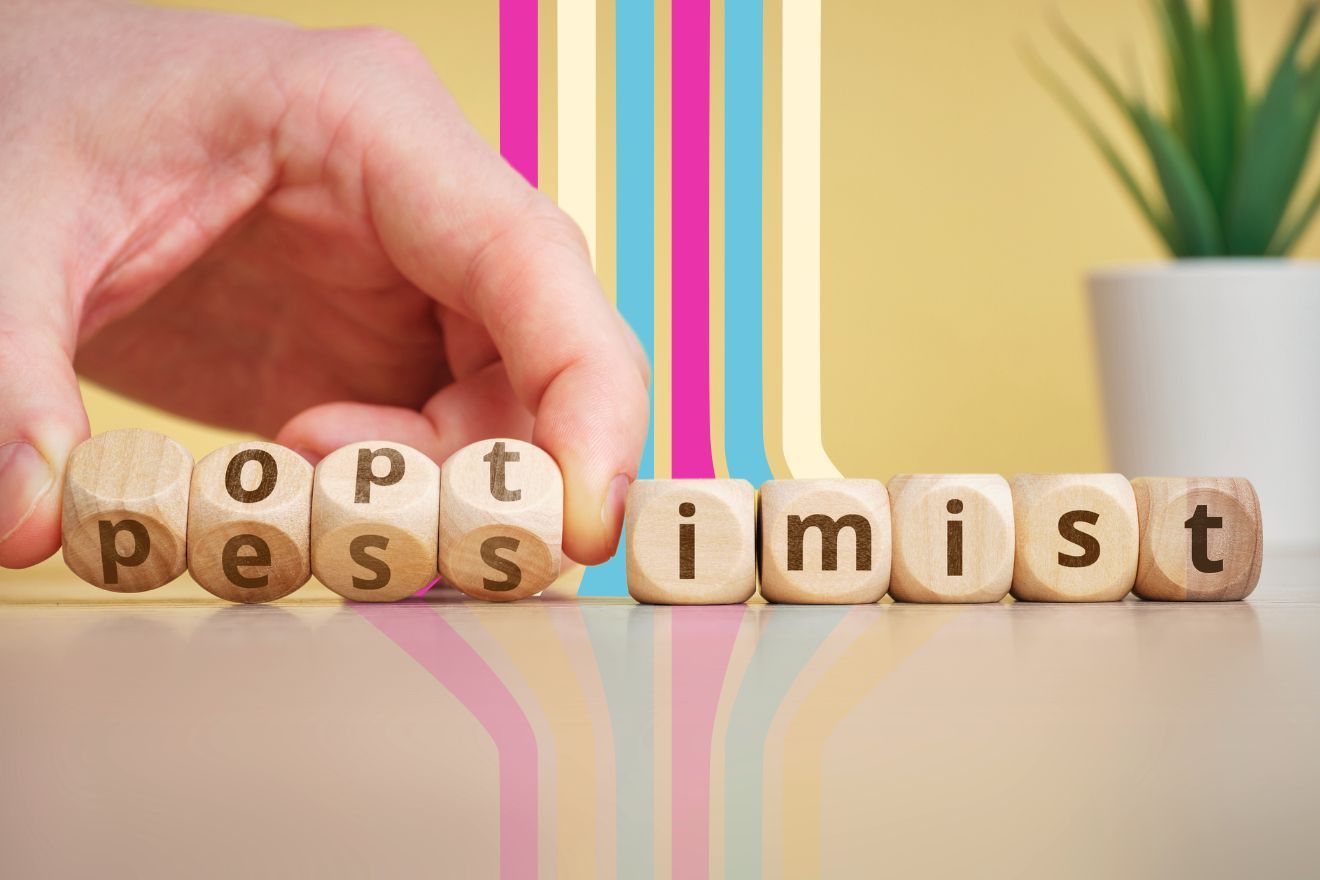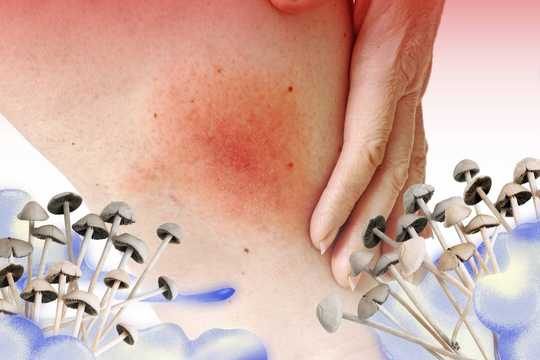Part of the reason why psychedelic experiences can be so therapeutic is that they can correct cognitive biases that underlie states like depression and anxiety. One bias that contributes to feelings of distress is the pessimism bias. This refers to the tendency to overestimate the likelihood of negative events occurring while underestimating the probability of positive things.
Researchers have shown that psychedelic-assisted therapy can help to combat the pessimism bias as well as increase feelings of optimism. Both of these effects together ultimately contribute to the alleviation of depression and anxiety.
It will be useful to explore research on psychedelics, pessimism, and optimism in greater depth. After doing so, I will also touch on the possibility that psychedelics may improve mental health by clouding our judgment. This would be through reductions in pessimism and increases in optimism.
The Link Between the Pessimism Bias and Poor Mental Health
A common example of pessimism bias would be individuals who always expect failures or negative outcomes in their lives. This is not only tied to depression but anxiety as well—one reason why depression and anxiety often occur together. Constantly expecting negative outcomes or ruminating about past negative experiences can lead to feelings of hopelessness, helplessness, and low self-worth. These are feelings that characterize depression. But only seeing a future of worst-case scenarios can also contribute to intense anxiety.
This kind of cognitive distortion not only leads to distressing thoughts and feelings, it can affect our behavior too. If you see a future that looks hopelessly bleak and negative, you may struggle with inaction, indecision, and withdrawal.
How Increased Optimism Benefits Our Mental Health
Studies have found that high levels of optimism are associated with lower levels of stress, increased social support, and effective coping strategies. All of these protect against depression [1]. When encountering difficulties in life, individuals with an optimistic view avoid hopelessness, which ensures good mental health outcomes.
A mental attitude characterized by hope and confidence in a positive future reduces the likelihood of experiencing depression and anxiety. When confronting difficult problems—such as the pressures of daily social and working life—optimists will experience a positive mix of emotions. This is not to say, of course, that no negative emotions (such as anger) are present. But there is, overall, an expectation of good results. Pessimists, in contrast, expect negative outcomes, and this is tied to feelings such as sadness and even despair.
Optimism is also associated with a range of positive behavioral outcomes. These include lower rates of alcohol and drug abuse and better social health (the ability to interact and form meaningful relationships with others).
Psychedelics Can Reduce the Pessimism Bias and Increase Optimism
A 2018 study by Taylor Lyons and Robin Carhart-Harris looked at the effect of psilocybin on pessimism biases. They specifically studied patients with treatment-resistant depression (TRD) [2]. This study involved 15 patients with TRD who showed a significant pessimism bias at baseline. This baseline bias was related to the severity of their depressive symptoms.
These patients performed the Prediction Of Future Life Events (POFLE) task at baseline and one week after their second psilocybin dosing session. (Patients were given psilocybin twice, 10 mg first and then 25 mg, with sessions separated one week apart.) The POFLE task requires participants to predict the likelihood of certain life events occurring within a 30-day period. After making these predictions, the actual rate of event occurrence is reported. This gives researchers a picture of how pessimistic or optimistic the participants’ mental attitudes are.
One week after psilocybin treatment, the pessimism bias and depressive symptoms in patients were significantly reduced. Moreover, the magnitude of change in both pessimism and depression was significantly correlated. The researchers also note that after treatment, patients were much more accurate at predicting the occurrence of future life events. Lyons and Carhart-Harris conclude that “psilocybin with psychological support might correct pessimism biases in TRD, enabling a more positive and accurate outlook.”f
A 2016 study published in the Journal of Psychopharmacology looked at the long-term mental health outcomes of cancer patients who were given psilocybin [3]. A high dose of psilocybin resulted in increases in optimism and decreases in anxiety, sustained at the 6-month mark.
We see similar results when it comes to the use of other psychedelics. Studies have demonstrated that LSD can increase optimism in healthy volunteers [4]. Researchers judged this by using the Revised Life Orientation Test (LOT-R). LOT-R measures how optimistic or pessimistic people feel about the future.
Can Psychedelics Improve Our Mental Health by Clouding Our Judgment?
False insights and beliefs are considered to be an epistemic risk of psychedelic use. Journalist Michael Pollan and philosopher Chris Letheby have addressed the concern that psychedelics may improve people’s mental health by providing them with comforting delusions. These supposed delusions might include belief in the afterlife, transcendent realities, or cosmic consciousness.
Letheby ultimately rejects this view (which he calls the “Comforting Delusion Objection”). He does so based on the acceptance of naturalism (no supernatural realms exist) and because he argues psychedelics heal us in other ways (e.g., by altering our models of self). But might psychedelics alleviate depression and anxiety by giving us comforting delusions that are non-metaphysical? Could psychedelics help people by giving them a rosy picture of the world?
In their 2016 paper, Lyons and Carhart-Harris note that it is not necessarily true that optimism is conducive to positive mental health. For example, there also exists an optimism bias. This refers to the tendency to overestimate the likelihood of experiencing positive events and underestimate the probability of experiencing negative events. Some argue that having an accurate perception of reality is crucial for maintaining positive mental health. Unrealistic optimism has drawbacks, after all, such as underestimating risks and failing to adopt preventative and/or protective measures.
The Complex Relationship Between Depression, Realism, and Psychedelic Therapy
Conversely, there are some benefits of having a pessimistic attitude, including risk aversion and avoiding disappointment by setting low expectations. Entertaining worst-case scenarios, moreover, may help one to cope with negative outcomes through contingency plans and preparedness. Stoic philosophers even recommended this strategy, which they called negative visualization.
Depression may, at times, be useful as well. After all, researchers have discovered a relationship between mild depression and accuracy in predictions [5]. These findings support the hypothesis known as depressive realism, proposed by psychologists Lauren Alloy and Lyn Yvonne Abramson. This is the view that depressed people are more accurate in their perceptions (since they are less prone to the optimistic bias).
However, it should be noted that people with more severe depression are less accurate in their predictions. So the depressive realism hypothesis seems only to hold when it comes to mild depression. In their study, Lyons and Carhart-Harris showed that while patients’ depressive symptoms were largely reduced, they did not quite reach levels comparable with healthy controls one week after treatment. Still, TRD patients made accurate predictions of future life events in line with the behavior of healthy control subjects. Post-psilocybin, there were no significant differences between these groups when it came to predicting both desirable and undesirable events.
It is unclear whether psychedelics may benefit some people’s subjective well-being by enhancing an optimism bias while dampening realistic or healthy pessimism. In any case, Lyons and Carhart-Harris state:
“[A] balanced, reality-focused perspective is optimal for mental health – as unrealistic optimism may encourage negligent and reckless behavior that could result in catastrophe, and unrealistic pessimism may lead to avoidant behavior, passivity, low mood, vulnerability to MDD [major depressive disorder] and perhaps related disorders”.
Further studies will be needed to assess the relationship between psychedelics and cognitive biases. So far, however, the evidence indicates that psychedelic therapy is effective at alleviating depression and anxiety while offering people a more accurate picture of their lives. And these two effects appear to be closely linked. This echoes the aims and results of other mental health treatments, such as cognitive behavioral therapy (CBT).
Follow your Curiosity
Sign up to receive our free psychedelic courses, 45 page eBook, and special offers delivered to your inbox.References
- Öcal, E.E., Demirtaş, Z., Atalay, B.I., Önsüz, M.F., Işıklı, B., Metintaş S., and Yenilmez, Ç. (2022). Relationship between Mental Disorders and Optimism in a Community-Based Sample of Adults. Behavioral Sciences, 12(2):52. doi: 10.3390/bs12020052.
- Lyons, T. and Carhart-Harris, R.L. (2018). More Realistic Forecasting of Future Life Events After Psilocybin for Treatment-Resistant Depression. Frontiers in Psychology, 9:1721. doi: 10.3389/fpsyg.2018.01721.
- Griffiths, R.R., Johnson, M.W., Carducci, M.A., Umbricht, A., Richards, W.A., Richards, B.D., Cosimano, M.P., and Klinedinst, M.A. (2016). Psilocybin produces substantial and sustained decreases in depression and anxiety in patients with life-threatening cancer: A randomized double-blind trial. Journal of Psychopharmacology, 30(12), 1181–1197. doi.org/10.1177/0269881116675513.
- Carhart-Harris, R.L., Kaelen, M., Bolstridge, M., Williams, T.M., Williams, L.T., Underwood, R., Feilding, A., and Nutt, D.J. (2016). The paradoxical psychological effects of lysergic acid diethylamide (LSD). Psychological Medicine, 46(7), 1379–1390. doi.org/10.1017/S0033291715002901.
- Strunk, D.R., Lopez, H., and DeRubeis, R.J. (2006). Depressive symptoms are associated with unrealistic negative predictions of future life events. Behaviour Research and Therapy, 44(6), 861–882. https://doi.org/10.1016/j.brat.2005.07.001.







